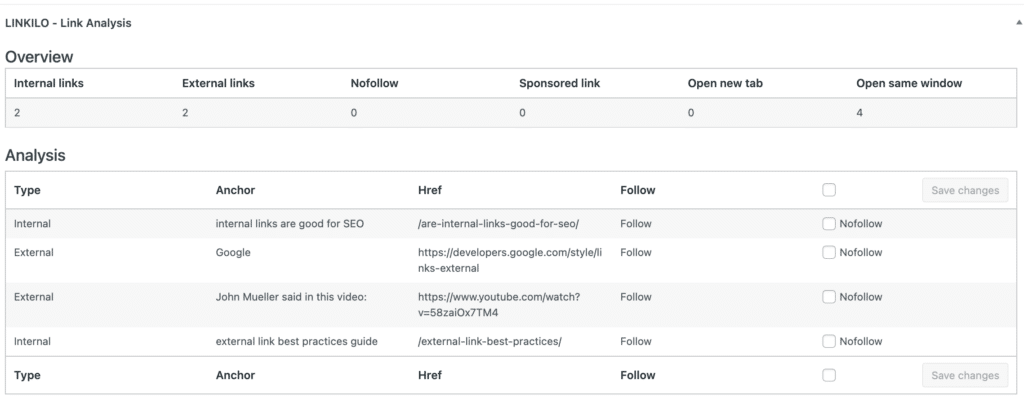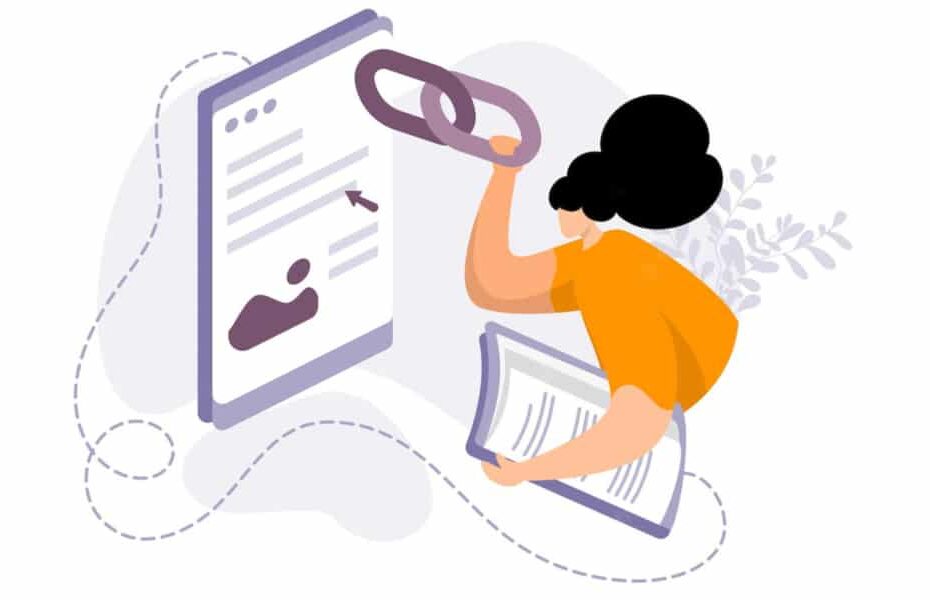Are you looking to build your website’s authority? Are you wondering what outgoing links/outbound links are?
Table of Contents
If so, then this blog post is for you. In it, we’ll cover what outgoing links/outbound links are and how they can help boost your website’s SEO. So, read on to learn more!
Many know that internal links are good for SEO and can boost exposure and organic results. However, suggestions to improve outbound links are few.
The industry is divided on optimizing outbound connections; some people think it’s essential to take it into account, while others don’t. There may be more factors to consider than we often do regarding how we link out from our content.
Outbound links are those that lead away from your website.
What are outbound links?
Outbound links are those that lead from your website to other websites. They are also referred to as external links because they send visitors to another website outside of your own.
They are frequently used in material to provide further context and direct readers to other sources that will provide crucial and additional information on the subject.
Outbound links are sometimes referred to as “authority links,” a term that stems from the fact that authors frequently employ outbound links to support material in their articles and connect to authoritative sources.
The most important goal for outbound links is to allow readers to leave your website in pursuit of additional information available on other pages located on external websites.
Outbound links increase the relevance of your website, especially when it comes to search engine algorithms. They provide a trail of “crumbs” that lead search engines back to your page and help them understand what you’re talking about.
This is why adding outbound links can positively impact your website rankings with Google Search – as long as you make sure to link only to high-quality resources relevant to the topic at hand.

Types of outbound links
Outbound links can be divided into two categories: nofollow and dofollow.
Dofollow/follow links
Every link you add to your website is automatically a do-follow link. If you’d rather, you may manually convert it to nofollow.
Search engines follow these links as they crawl your website. Site-to-site link ranking power, or “link juice,” is transferred via these pathways.
Use a do-follow link if you wish to offer credit to a website. Give credit where credit is due because it is right and moral to do so. You are giving them authority and trust by linking to another website, which is another function of dofollow links.
Nofollow links
Rel=” nofollow” tags are used in nofollow links to instruct search engines not to follow them. This indicates that the target website does not receive any link value from these links. Search crawlers are essentially stopped in their tracks by nofollow links.
Links posted by readers in the comment section should therefore have nofollow tags added because they may lead search engine crawlers to spammy websites. Your trust factor will suffer due to the search engine’s reduced perception of your credibility.
Nofollow links should also be used for affiliate links, paid connections, and links to product pages. Since these links can bring in money, Google, by default, mandates that you nofollow them. Otherwise, you risk losing the search engine’s trust and seeing a decline in ranking.
Why are outbound links important?
You are directed to another webpage or website using outbound links. Except for a few, most websites contain outbound links.
Outbound links can be categorized as follows:
- Nofollow link
- Dofollow link
Dofollow links are specific website links. There is no need to code or modify the link. Every time you create a link, it automatically has the do-follow attribute. A dofollow link enables the target website to benefit from your website’s Google PageRank.
A usual link says “nofollow.” Google PageRank prevents you from ranking with a webpage rather than giving you leverage over it. The Google spider cannot follow a nofollow link since it has the rel=nofollow tag.
Why should you use outbound links?
If you haven’t considered how to incorporate outbound links into your content, you really should.
There are several reasons why they should be given greater attention, even though they are not the first item most SEOs consider when analyzing their sites and developing effective methods.
Adding value and context
When you include links to other resources in your writing, site readers can browse those pages and learn more about the topics you are discussing. This enhances the worth of your writing and can give readers a complete understanding. Use them to improve the quality of your writing, develop the subject, and reinforce topical signals.
Strengthen topical signals and add depth
Linking to pertinent content improves the subject signals of your web pages and gives Google more context to analyze your website.
Outbound links can connect readers to further resources they can use to learn more about specific concepts and can assist show how in-depth the subject you are writing about is. This is crucial when writing about complex subjects since readers may need an extra explanation to grasp the cited material.
To naturally create amazing content and add depth, outbound connections are essential.
It builds your reader’s trust
Do you recall learning in school that sources must support quotes, facts, and statistics?
Outbound links are the preferred method of referencing sources while writing on the internet. The Google staff members themselves have often attested to this.
Citing your sources has never been more crucial in a world where fake news is all too frequent. Make sure you are using the version that is considered to be the most reliable.
It is simple to find a fact, statistic, or quote on a website and immediately claim it as the source, yet frequently the information is attributed elsewhere. Always utilize the original version when possible to lend added credibility.
Do outbound links affect SEO?
Outbound linking does not result in any ranking advantage, according to Google. According to their position, linking to an authoritative domain is not always important for SEO. Their official position is that it neither helps nor hinders your SEO.
However, they do promote external link best practices and guidelines that hint at what an external link should be:
Our documentation often relies on the reader knowing something about third-party standards or software. In such cases, it’s better to link to good documentation elsewhere than to try to thoroughly document someone else’s standard in our documentation.
Google
Furthermore, John Mueller said in this video:
“Linking to other websites is a great way to provide value to your users. Oftentimes, links help users to find out more, to check out your sources, and to better understand how your content is relevant to the questions that they have.”
Our experience has led us to feel that outbound links can highlight your content’s context while fostering a sense of trust among the intended audience. It won’t hurt, and in a few limited circumstances, it might even gradually assist. Using outbound links, the best course of action is to connect to comprehensive, in-depth studies on reputable domains.
How to choose high-quality outbound links
Which links should you include in your blog articles and other pages that may be on your mind at this point? The following considerations should be made as you choose which backlinks to include.
Choose relevant links from websites that you can tell are genuinely browsing and linking to your website. Finding excellent outbound links, however, is much trickier than that.
Additionally, you should confirm that the links you are establishing are pertinent to the setting of your page. Semantic relevance is the term for this. This is because the text is contextualized by search engines depending on surrounding links. Ensure that the context of the paragraph in which you add an outbound link and the website it points to are closely related.
You must make sure that the pages you link to are typically in addition to considering context at both the paragraph and page levels. Avoiding those pages would entail avoiding the following:
- Spam off-page
- Website spam
What occurs if you link to pages that don’t fit the requirements above? Your search engine rankings could suffer more if you connect to spammy websites.
You can also use an outbound link checker like Linkilo, which counts the number of outbound links you’ve added to each post or page. It counts both followed and nofollowed outlinks, so pay attention to them!

Check out our external link best practices guide for more information.
Understanding Anchor Text & Its Role in SEO
Anchor text is an important part of SEO because it helps search engines better understand the content of a webpage. The clickable, underlined text can be found within a link.
This text helps search engine crawlers determine what the linked page is about and how it relates to the current page. For example, if you include anchor text like “Best internal linking tool” in a link to a page about internal linking tools, it would help Google understand that the page is related to a tool for internal linking.
Using relevant and descriptive anchor texts from your website benefits you and those you’re linking to. Not only does this help ensure that users are taken to relevant pages, but it also helps improve your overall search engine rankings by providing quality backlinks and increasing your website’s relevance for certain keywords.
It is important to remember that Google rewards websites with an abundance of relevant external and internal links because they are seen as more trustworthy by search engines.
When creating anchor texts for external links, make sure they are concise and descriptive so that users know exactly what they will find when they click on them. Additionally, use targeted keywords in your anchor texts whenever possible to benefit from increased keyword rankings and increased traffic from those who click on them.
Finally, ensure not to overuse anchor text or irrelevant keywords because this could lead to penalties from Google or other search engines for keyword stuffing or unnatural link-building practices.
Conclusion
Outgoing links, also known as outbound or external links, are hyperlinks on your website that direct users away from your domain.
Outbound links frequently don’t get the recognition they merit. However, they might affect SEO in both good and bad ways. Everything depends on the linking techniques you choose.
Focus on making your material easy to use and helpful for visitors. Only link to high-quality third-party properties with your outbound URLs while keeping a balance with their number.
Therefore, you’ll be able to add a few extra points to your entire website development plan with the correct knowledge and techniques, which might result in long-term results.





